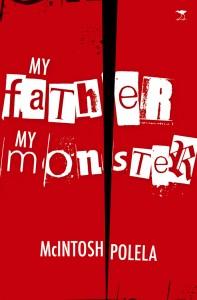Posted on February 25, 2012

The description of McIntosh Polela's My Father, My Monster as 'a memoir so painful it bleeds off the pages' by the Sunday Independent is a red herring hiding the honesty driving the memoir to its irresolute end. It is an honesty which at times seems too revealing, too vulnerable, to the point where I felt like telling Polela to stop writing: people will read his story and be drawn to intimacies that they shouldn't be privy to. Pain is not this memoir's defining feature; the defining feature is rather an honesty so intense that it seems to be a tool fashioned by the author to understand and finally cleanse himself of a back story of struggle over which he had no choice.
Polela's memoir is told in two parallel, distinct strands: the first concerns his personal growth in terms of his material welfare. Here we learn about the financial struggles he had to overcome in order to attain an education. The struggle was thrust on him and his younger sister after their mother died at their father's hand and they were forced to move to rural KwaZulu-Natal to live with their maternal grandmother. The second strand is his emotional development. This strand has at its heart his unanswered questions about his father's motives for killing their mother and abandoning them to poverty and abuse by distant relatives. It is Polela's frank discussions about his feelings around these questions that give the narrative its bleeding quality.
He describes himself as "nearly, fourteen and becoming ever so self-conscious. I had also started taking an interest in girls - but I hated myself". I wanted to hide.'(56) It seems that Polela's teenage years were some of the most turbulent of his life not only because they were marked by the common self hatred of adolescence, but because this occurred against a backdrop marked by poverty, physical abuse and most importantly, the inter-party warfare of the early '90's that threatened to bring the northern KZN to its knees. He describes the fear and uncertainty that came with being branded an African National Congress (ANC) member in an Inkatha Freedom Party (IFP) stronghold. This drove him to make his own guns for a battle which he later judged to demand too high a cost: his education and his life.
Polela's showdown with his father and ultimately himself occurs after he has completed tecknikon, having survived hardship, found some material comfort and pieced his self esteem together through achievement and assertiveness. He begins to look for his father, not to kill him as he had wanted to as a teenager, but to get closure and have all his lingering questions about his mother's death answered. When he does meet his father, he encounters a disappointment – an old man who in spite of attaining great wealth was twisted bitter and marked by a constant need to abuse his wives and girlfriends, and oppress his children. Polela meets his extended family on his father's side and realises that better he was abused and starved by his maternal relatives than denied an education by his father out of spite and subjected to his father's bitter need to control.
Polela's quest requires some pause. If we live in a society that sees black men in black and white, that is, either brands black men, especially young black men, as angry, heartless, cruel rapists or good black boys who listen when they are spoken to and have hearts of gold, where does Polela fall? At times he is a cadre who tortures IFP members and dreams of patricide. At other times he is a man determined to educate himself even though circumstance is stacked against him, and hugs and kisses his little sister goodbye.
At first glance this memoir seems to be about a young man on a truth-seeking quest to find his father, gain closure and become more of a man. But it is only on getting to the end of this memoir that I understood that Polela's great quest was to accept and understand not himself but rather the back story that he had so desperately tried to turn his back on and reject. We are occupying a space in South African history where black identity occurs outside the inherited boxes of the 'good' and 'bad' native and as a result is incapable of being understood because it cannot yet be classified. Polela's memoir is a voice insisting on the heterogeneity of black identity by painting a true, complex portrait not only of his life but of his emotions with an awareness that his is not the 'black south African story' but rather one account of many that form the larger South African story.
Busi Mnguni is an Honours student in the Department of English at the University of Cape Town.